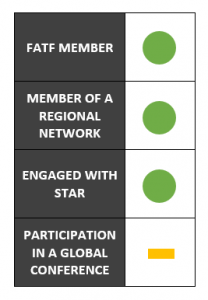Overview
Corruption perceptions in Mexico are alarming. Mexico ranks poorly on international indices,1 with corruption permeating all levels of politics and society.2 Mexico also fares relatively poorly in terms of ranking on the 2018 Basel AML Index, indicating a moderate risk of money laundering.3
In recent years there have been efforts in the right direction to tackle endemic corruption and asset recovery in Mexico — some more successful than others. This has included the creation of the General Audit Office (Auditoría Superior de la Federación), which is able to demand the recovery of assets in certain cases, as well as the payment of compensation. The National Anti-Corruption System is another effort that has not yet seen results. It is a set of laws and institutional reforms meant to facilitate transparency and reduce impunity for corruption-related crimes. It has, however, fallen victim to political infighting. Three years after its approval, the Senate has yet to name the special prosecutor on corruption-related crimes or fill key vacancies, including the 18 magistrates that are supposed to investigate and prosecute administrative misconduct.4
The design of the Mexican legal framework makes asset tracking and recovery possible but difficult and time consuming.5 However even were the legal framework simplified, impunity and corruption in the justice system makes the prospects for prosecution slim.6
State governors and the Oderbrecht case
Several ongoing cases are open against former governors of Mexico’s 31 states, including César Duarte, the former governor of Chihuahua. He was accused of embezzling 79 million pesos and fled Mexico in March 2018, allegedly to the United States. Twenty properties belonging to César Duarte have been seized since he fled. He was known for his lavish lifestyle and is accused of using an official helicopter to fly friends and family to his ranch at weekends.7 Another case is that of Tomás Yarrington, the former governor of Tamaulipas who also fled and was arrested in Italy in 2017. Some of the assets forfeited include: a US$ 640,000 condominium, alleged to be the proceeds of corrupt payments received from the Gulf Cartel in exchange for non-interference in their criminal enterprise by public officials and law enforcement; a Pilatus aircraft; a 46,175-acre tract of land in Bexar County, Texas; and a residence in Port Isabel.8 A further case includes Javier Duarte, former governor of Veracruz, who was arrested in Guatemala after a six-month manhunt crossing three continents. He is alleged to have misappropriated over 55 billion pesos (USD 2.97 billion).9
The Oderbrecht investigations affecting the Americas have also impacted Mexico. Unlike in other countries in the region, two separate federal investigations into the case have stagnated. The lack of progress in the Odebrecht case has been a sore point in Mexico since late 2016, when the company admitted to U.S., Swiss and Brazilian authorities in a multibillion-dollar settlement that it had paid USD 10.5 million in bribes to Mexican officials.10
International Institutional Engagement
Mexico is a member of Financial Action Task Force of Latin America (GAFILAT)11 which is a regional body implementing the FATF Forty Recommendations. The latest FATF Report from 2018 shows that Mexico has a good system to tackle money laundering and terrorist financing, but should step up efforts in pursuing launderers and confiscating their assets to mitigate the significant risks.12 Mexico is also part of the GAFILAT Asset Recovery Network, which is a regional informal network that seeks to exchange information, as well as best practice, on asset forfeiture, confiscation and money laundering in Latin America.
Mexico has 12 Information Exchange Agreements (all in force), through the which the Tax Administration Services – Servicio de Atribución Tributaria (SAT) – shares and receives information with institutions in charge of the collection tributary. In addition, since May 2010 Mexico has acceded to the Convention on Assistance Mutual Management in Fiscal Matters of the OECD and the Council of Europe, which allows access to a broad international cooperation network for the exchange of information in fiscal matter.13

Our reports on Mexico
Sources
[1] https://www.transparency.org/cpi2018
[2] https://www.bti-project.org/en/reports/country-reports/detail/itc/mex/
[3] https://index.baselgovernance.org/ranking
[4] Interview with CiFAR staff.
[5] https://thelawreviews.co.uk/edition/the-asset-tracing-and-recovery-review-edition-6/1174624/mexico
[7] BBC, “Fugitive Chihuahua governor Duarte’s bison seized”, 26 February 2017, https://www.bbc.com/news/world-latin-america-43195550 [accessed 30 September 2018].
[8]StAR Corruption Cases Database, https://star.worldbank.org/corruptioncases/search/site/mexico?db=All&solrsort=ss_jurisdiction_origin%20asc&rows=50 [accessed 30 September 2018].
[9] The Guardian, “Mexico: wife of captured ex-governor living high life in London, rival alleges”, 30 May 2018,
https://www.theguardian.com/world/2018/may/30/mexico-karime-macias-london-governor-veracruz [accessed 30 September 2018].
[10] The New York Times, Mexico Could Press Bribery Charges. It Just Hasn’t.”, 11 June 2018, https://www.nytimes.com/2018/06/11/world/americas/mexico-odebrecht-investigation.html [accessed 30 September 2018].
